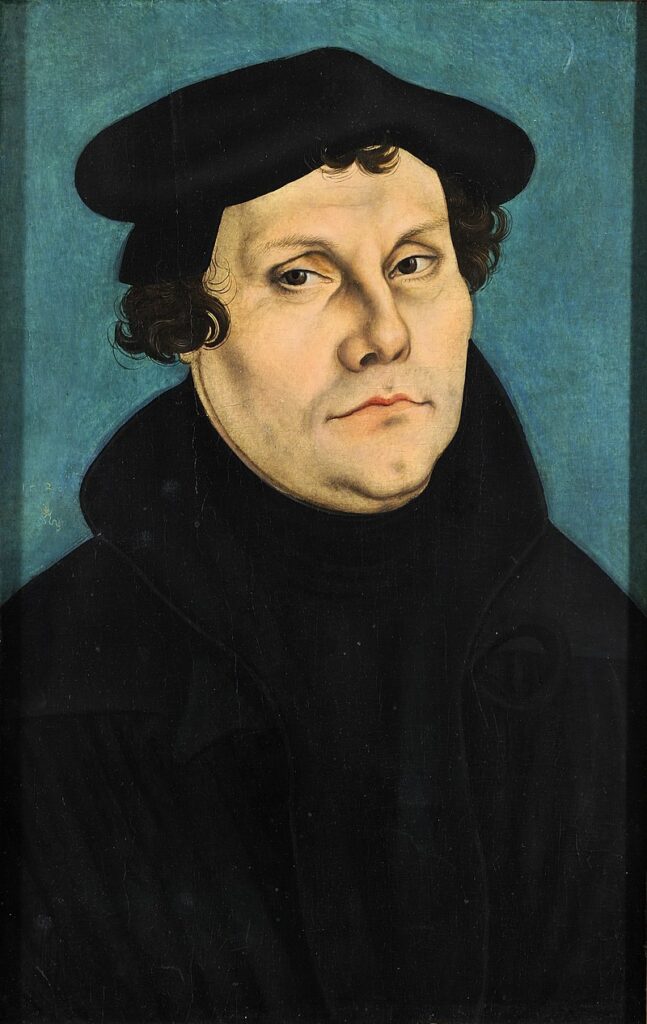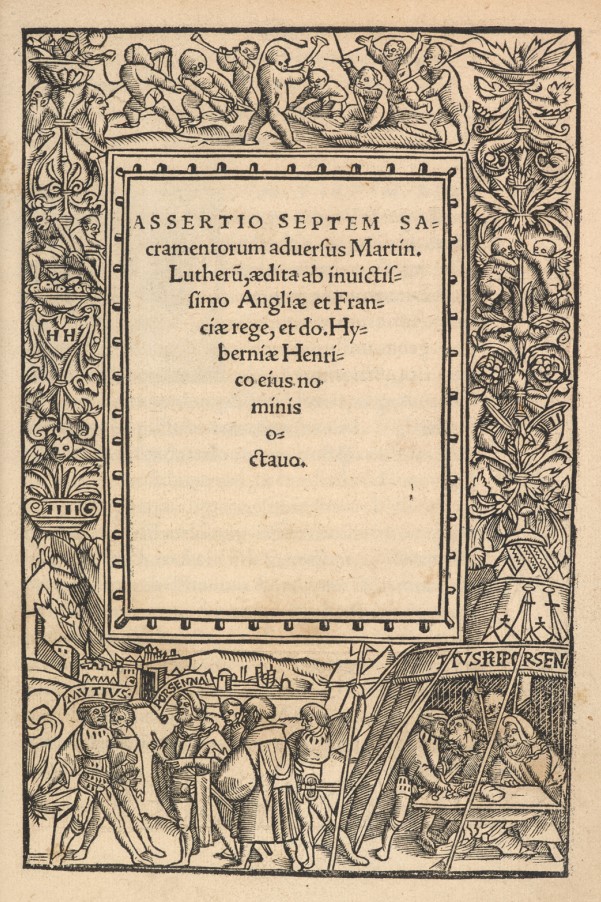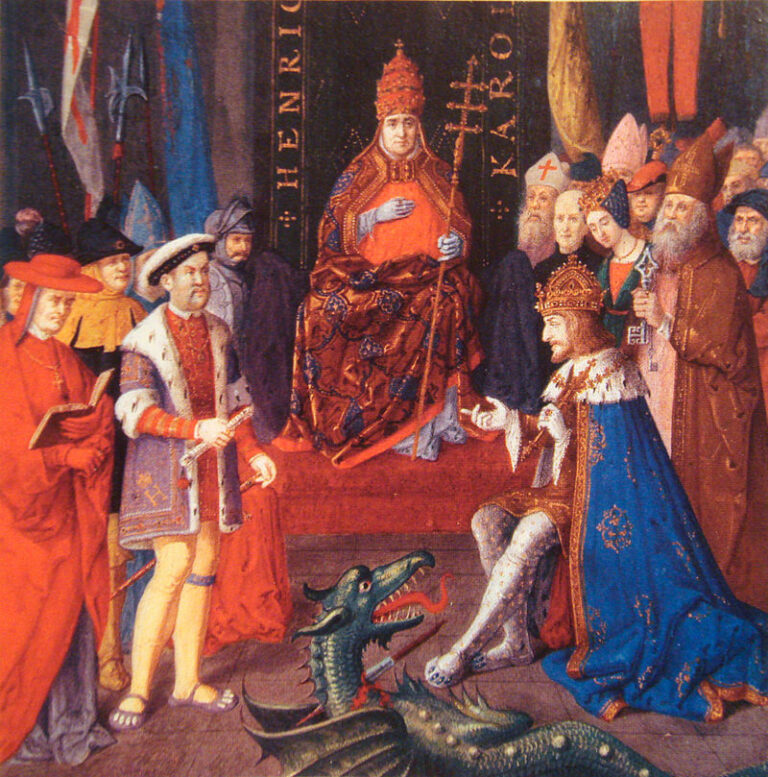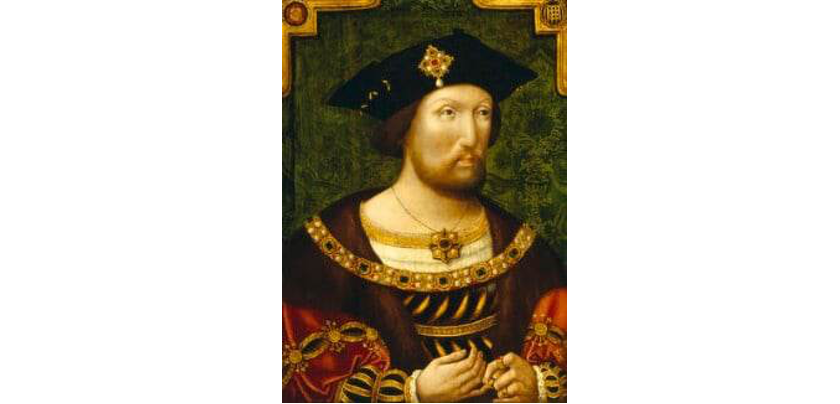In 1519, Henry VIII read Martin Luther’s 95 Theses. As a devout son of the Catholic Church, one who may even have been intended for Church himself before his brother’s untimely death, Henry was horrified by Luther’s treatise. He felt compelled to respond to Luther’s attacks on the Church, which became the impressive tome ‘Assertio Septem Sacramentorum,’ or ‘Defence of the Seven Sacraments.’ This weighty volume was a serious piece of theology, and an impressive achievement for anyone, let alone someone as busy as a king of England.

It has been suggested that Thomas More was involved with the writing of the book, though to what extent is still debated. We know that Henry was the principal mind behind the work as we have his personal copy of another book of theology with marginal notes made in his own hand that directly relate to ‘Defence of the Seven Sacraments.’ When Luther wrote a response in 1522, entitled ‘Contra Henricum Regem Anglie,’ More was certainly commissioned by Henry to write ‘Responsio ad Lutherum’ as a reply.
Henry dedicated the book to Pope Leo X, writing to the latter in May 1521 to explain and profer the book to him. Upon receiving a copy of the book from John Clark, Pope Leo wrote a reply to Henry, praising his efforts and expressing his gratitude for the robust defence of the Roman Catholic Church and the papacy. In recognition of this, Pope Leo conferred upon Henry the title of ‘Fidei Defensor’ or ‘Defender of the Faith.’ Though it was revoked by the papacy upon Henry’s split with Rome, Henry retained the title, and had it formally conferred upon him and his heirs by Parliament in 1543. All kings and queens of England have retained the title to this day.
~
LETTER FROM HENRY VIII TO LEO X – 21st May 1521
Most Holy Father: I most humbly commend myself to you, and devoutly kiss your blessed feet. Whereas we believe that no duty is more incumbent on a Catholic sovereign than to preserve and increase the Christian faith and religion and the proofs thereof, and to transmit them preserved thus inviolate to posterity, by his example in preventing them from being destroyed by any assailant of the faith or in any wise impaired, so when we learned that the pest of Martin Luther’s heresy had appeared in Germany and was raging everywhere, without let or hindrance, to such an extent that many, infected with its poison, were falling away, especially those whose furious hatred rather than their zeal for Christian truth had prepared them to believe all its subtleties and lies, we were so deeply grieved at this heinous crime of the German nation (for whom we have no light regard), and for the sake of the Holy Apostolic See, that we bent all our thoughts and energies on uprooting in every possible way, this cockle, this heresy from the Lord’s flock. When we perceived that this deadly venom had advanced so far and had seized upon the weak and ill-disposed minds of so many that it could not easily be overcome by a single effort, we deemed that nothing could be more efficient in destroying the contagion than to declare these errors worthy of condemnation, after they had been examined by a convocation of learned and scholarly men from all parts of our realm. This course of action we likewise recommended to a number of others. In the first place, we earnestly entreated His Imperial Majesty, through our fraternal love for him, and all the electoral princes, to bethink them of their Christian duty and their lofty station and to destroy this pernicious man, together with his scandalous and heretical publications, after his refusal to return to God. But convinced that, in our ardor for the welfare of Christendom, in our zeal for the Catholic faith and our devotion to the Apostolic See, we had not yet done enough, we determined to show by our own writings our attitude towards Luther and our opinion of his vile books; to manifest more openly to all the world that we shall ever defend and uphold, not only by force of arms but by the resources of our intelligence and our services as a Christian, the Holy Roman Church. For this reason we have thought that this first attempt of our modest ability and learning could not be more worthily dedicated than to your Holiness, both as a token of our filial reverence and an acknowledgment of your careful solicitude for the weal of Christendom. We feel assured that our first fruits will be enhanced in value if it be approved by the wholesome judgment of your Blessedness. May you live long and happily!
From our royal palace at Greenwich, the twenty-first day of May, 1521, Your Holiness’ most devoted and humble son, Henry, by the grace of God King of England and France, and Lord of Ireland.
~
THE DEDICATION AT THE FRONT OF ‘DEFENCE OF THE SEVEN SACREMENTS’
To our most holy Lord Leo X chief bishop, Henry, king of England, France, and Ireland, wisheth perpetual happiness
Most Holy Father:

Perhaps it may appear strange to Your Holiness, that Part of our Youth being spent in martial Affairs, and Part in the Studies of Things belonging to the Common-wealth; we should now undertake the Task of a Man, that ought to have employed all his Time in the Studies of Learning; in opposing Ourself against this growing Heresy. But Your Holiness (I suppose) will the less admire, when You consider the Reasons that obliged Us to take upon Us this Charge of Writing. We have seen Tares cast into our Lord’s Harvest; Sects do spring up, and Heresies increase so much as almost, to overthrow the Faith of Christ: And such Seeds of Discord are sown abroad in the World, that no sincere Christian, can suffer, or endure any longer their spreading Mischiefs, without an Obligation of employing all his Studies and Forces to oppose them. Your Holiness ought not therefore to wonder, if We (not the greatest in Ability, yet in Faith and Good- will inferior to none,) have proposed to Ourself, to employ our Force and Power in a Work so necessary, and so profitable, that it cannot lightly be omitted by any, without Offence ; also to declare Our great Respect towards Your Holiness, Our Endeavours for the Propagation of the Faith of Christ, and Our Obedience to the Service of Almighty God: Greatly confiding, that although our Learning is not much, nay in Comparison, even Nothing; yet His Grace will so co-operate with Us, that what we are not able thereby to effect, He, by his Benignity and Power, may more fully perform, and by his Strength supply Our Weakness therein. Though we know very well, that there are every-where several more expert, especially in Holy Writ, who could have more commodiously undertaken this Great Work, and performed it much better than We; Yet are We not altogether so ignorant, as not to esteem it Our Duty, to employ, with all Our Might, Our Wit and Pen in the common Cause. Por having, by long Experience, found, that Religion bears the greatest Sway in the Administration of Public Affairs, and is likewise of no small Importance in the Commonwealth; We have employed no little Time, especially since We came to Years of Discretion, in the Contemplation thereof; wherein We have always taken great Delight: And though not ignorant of Our small Progress therein made; yet, at least, it is so much, as, We hope, (especially with the Help, or rather Instigation of such Things as can instruct the most Ignorant, viz. Piety, and the Grief of seeing Religion abused,) will suffice for Reasons to discover the Subtilties of Luther’s Heresy. We have therefore, (confiding in those Things,) entered upon this Work; dedicating to Your Holiness what We have meditated therein; that, under Your Protection, who are Christ’s Vicar upon Earth, it may pass the public Censure. Por we are persuaded that this Heresy, having for some Time exercised its Rage amongst Christians; and being by Your most weighty and wholesome Sentence condemned, and, as it were, by Force plucked out of Men’s Hands, if any Thing remains hidden in the Bowels of it, fed by Flattery and fair Promises; it is to be rooted out by just Reasons, and Arguments; that, as Men’s Wits suffer themselves more willingly to be led than drawn; so Reason also may supply these with the mildest Remedies. Whether or no any Thing is effectually done in this, shall rest to Your Holiness’s Judgment: If We have erred in any Thing, We offer it to be corrected as may please Your Holiness.
~
LETTER FROM LEO X TO HENRY VIII – 4th November, 1521
To Our Most Christian Son in Christ, Henry, King of England, Illustrious Defender of the Faith.
Most dear Son in Christ, Health and Apostolic Benediction:

Some days ago, when the envoy of Tour Serenity, Our beloved Son, John Clark, Dean of the Chapel Royal, publicly in Consistory presented us the book which Your Serenity has published against the impious teachings and sect of Martin Luther, and in a brilliant address, exceedingly appropriate to the occasion, declared, in the presence of a number of Prelates of the Roman Court, your readiness to aid Us .and the Holy See with sword and pen, our soul was filled with joy. Wot We alone, but all Our venerable brethren rejoiced, as though deeming that Luther’s impiety had, not with- out the divine permission, assailed the Church of Christ, so that to her greater glory she might be fortunate enough to find such a champion and defender.
Hence We have resolved, and all agree in Our decision, that your exceptional virtue and piety should be made memorable by some mark of Our love and appreciation. For if it has often been, most dear Son, a source of honour to great monarchs to take up arms to safeguard the liberty and tranquillity of the Holy Apostolic See, how much more glory and reverence should accrue from employing the weapons of the Spirit of God and of heavenly science to remove from the faith of Christ so great a stain, and to preserve inviolate those sacraments by which the salvation of souls is secured.
These two functions, which hitherto We have always found separate, have been united in you alone, a mighty sovereign, in a most eminent degree; for you have both vindicated the liberty of the Church with your arms, and you have evinced your desire to fortify the Christian faith against impious heresy by the treasures of your piety and learning. The one is an evidence of invincible and lofty courage, the other of a spirit and sense of religion tender, devout, and orthodox.
In what words, then, or by what manner of eulogy shall we praise this piety, this plenitude of doctrine, overflowing as though from a celestial fountain? What fit return can we make for your kindness in dedicating to us so noble a product of your intellect? Both considerations exceed the powers of language, or even of thought; nor can we reflect on your services and deserts without being overcome.
What love, what zeal is yours for the defence of Christian faith! What benevolence in Our regard! And in the book itself, what solidity of matter, clearness of method, force of eloquence, wherein the Holy Spirit Himself shows visibly! It is thoroughly judicious, wise, and pious; charitable in instruction, gentle in admonition, correct in argument. If there be any of your opponents who have not fallen entirely into the power of the Prince of Darkness, they must be drawn by your writings to a saner condition of mind, if any chance for sanity be left.
These are distinguished and admirable achievements; and as they have been wrought in a new fashion, by a princely favour, for Almighty God and the Holy See, we render you, DEFENDER OF THE FAITH, unbounded thanks. The Apostolic See thanks you; all who worship Christ and unite in His faith thank you. Wa, for Our part, with the concurrence, of Our venerable brothers, bestow on you, in other letters sealed with lead, as you will find from their perusal, this title of DEFENDER OF THE FAITH. For your part, most dear Son, however you may consider great and desirable these honours which the Holy Apostolic See grants you as a reward of eminent virtue and a mark of its grateful appreciation, realize that greater and more glorious compensation is prepared for you in heaven by Our Lord and Saviour. In upholding His cause and His spouse by every means of defence you have displayed your spirit and your virtue; and while you review those titles which you have acquired on earth and in heaven, remember by what claims you have gained them. Show yourself hereafter such as you have been heretofore. Let your later deeds be equal to your sublime and glorious beginnings. Let the Apostolic See, once defended by your arms, and the Christian faith, now fortified by the shield of your doctrine against the criminal frenzy of heretics, find and prove you ever a helper in all their perils, so that this extraordinary and unspeakable glory which Your Majesty has most mightily merited by your great efforts may continue to the last day of your life and endure to all future time as a theme of eulogy.
Given at Rome, at St. Peter’s, under the seal of the Fisherman, the fourth day of November, 1521, the ninth year of Our Pontificate.

It has been suggested that the scroll Henry holds is the papal bull conferring upon him the title of ‘Defender of the Faith.





